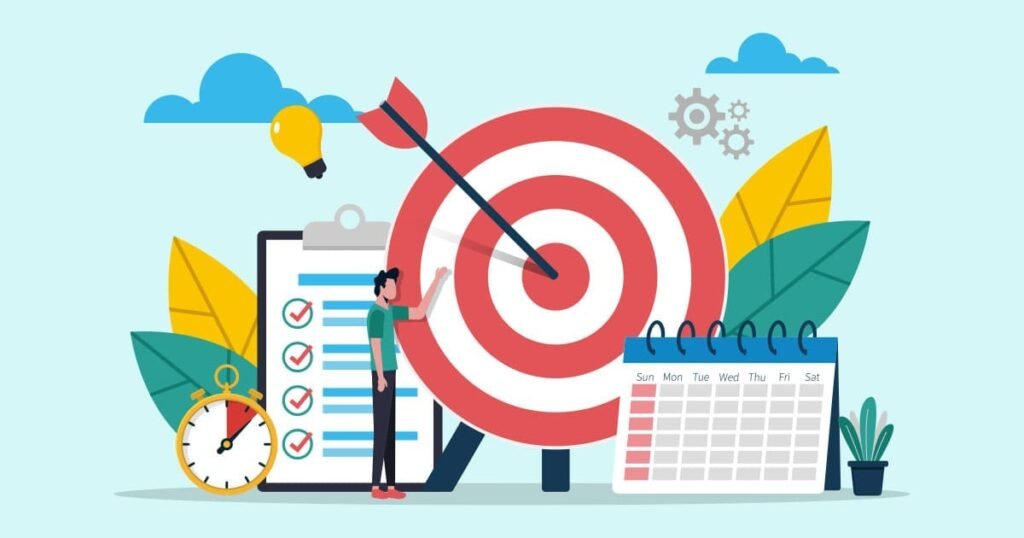In today’s fast-paced digital world, having a robust digital marketing strategy is crucial for any business looking to succeed. At Bigwigo Production and Media Agency, we understand that navigating the digital landscape can be complex. That’s why we’ve put together a comprehensive guide on the five key components that make up an effective digital marketing strategy.
Let’s dive in!
1. Clear Goals and Objectives
The foundation of any successful digital marketing strategy is a clear set of goals and objectives. Without a defined direction, your marketing efforts may lack focus and effectiveness. Here’s how to set clear goals:
- Specific: Clearly define what you want to achieve. For example, increase website traffic by 20% in the next six months.
- Measurable: Ensure your goals can be quantified. Use metrics such as conversion rates, click-through rates, and engagement levels.
- Achievable: Set realistic goals that can be accomplished with the resources available.
- Relevant: Align your goals with your business objectives and market demands.
- Time-Bound: Set a timeline for achieving your goals to maintain momentum and accountability.

2. Comprehensive Audience Research
Understanding your target audience is crucial for crafting a message that resonates. Comprehensive audience research involves:
- Demographics: Gather data on age, gender, location, income level, education, etc.
- Psychographics: Understand your audience’s interests, values, attitudes, and lifestyles.
- Behavioral Insights: Analyze how your audience interacts with your brand online, including their purchasing behavior and content preferences.
- Pain Points and Needs: Identify the problems your audience faces and how your product or service can solve them.
Tools like Google Analytics, social media insights, and customer surveys can provide valuable data for audience research.

3. Strong Content Marketing
Content is king in the digital marketing realm. Quality content attracts, engages, and converts prospects. Here’s how to develop a strong content marketing strategy:
- Content Planning: Create a content calendar to organize and schedule your content.
- Diverse Formats: Use various content formats like blog posts, videos, infographics, podcasts, and social media posts to reach a broader audience.
- SEO Optimization: Optimize your content for search engines to increase visibility. Use relevant keywords, meta tags, and high-quality backlinks.
- Value-Driven Content: Focus on creating content that provides value to your audience, whether it’s educational, entertaining, or inspiring.
- Consistency: Maintain a consistent posting schedule to keep your audience engaged and build trust.

4. Multi-Channel Approach
A multi-channel approach ensures you reach your audience wherever they are. It involves:
- Social Media Marketing: Engage with your audience on platforms like Facebook, Instagram, LinkedIn, and Twitter. Tailor your content to suit each platform’s unique features.
- Email Marketing: Use email campaigns to nurture leads, promote content, and keep your audience informed about updates and offers.
- Search Engine Marketing (SEM): Run paid ads on search engines like Google to capture high-intent traffic.
- Content Marketing: Distribute your content across various channels, including your website, blog, and guest posts on other sites.
- Influencer Marketing: Partner with influencers in your industry to expand your reach and credibility.

5. Data Analysis and Optimization
Regularly analyzing your marketing efforts helps you understand what’s working and what needs improvement. This involves:
- Key Performance Indicators (KPIs): Track KPIs such as website traffic, conversion rates, engagement metrics, and ROI.
- Analytics Tools: Use tools like Google Analytics, social media analytics, and marketing automation platforms to gather and analyze data.
- A/B Testing: Test different versions of your ads, emails, and landing pages to see which performs better.
- Feedback Loop: Collect feedback from your audience and use it to improve your products, services, and marketing strategies.
- Continuous Improvement: Regularly update and refine your strategy based on data insights and market trends.

Conclusion
An effective digital marketing strategy is built on clear goals, in-depth audience research, strong content, a multi-channel approach, and continuous data analysis and optimization. By focusing on these key components, you can create a powerful strategy that drives growth and success for your business. At Bigwigo Production and Media Agency, we’re here to help you navigate the digital landscape and achieve your marketing goals. Reach out to us to learn how we can elevate your digital marketing efforts.


